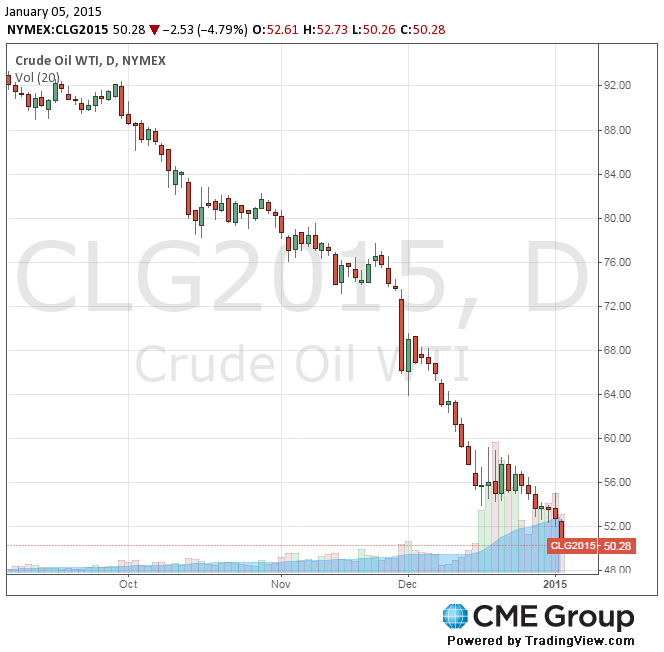- Оil fell
Notícias do Mercado
Оil fell
Brent oil fell below $55 a barrel for the first time since May 2009 as surging supply from Russia and Iraq bolstered speculation the global glut that drove crude into a bear market will persist.
Futures slid as much as 5.1 percent in London and 4.3 percent in New York. Russia's output rose to a post-Soviet high in December, preliminary Energy Ministry data showed. Iraq, the second-largest producer in the Organization of Petroleum Exporting Countries, plans to boost crude exports to a record this month, the Oil Ministry said.
"This bearish market is being fed by a combination of surging supply and shaky demand," John Kilduff, a partner at Again Capital LLC, a New York-based hedge fund that focuses on energy, said by phone. "We now have Russian production at a post-Soviet high and the Iraqis planning to add even more supply to the market. This just adds to negative market sentiment."
Brent slumped 48 percent last year, the most since the 2008 financial crisis, as OPEC resisted calls to cut output amid a battle with U.S. shale producers for market share. The 12-member group pumped above its target for a seventh straight month in December, according to a Bloomberg survey.
Brent for February settlement declined $2.83, or 5 percent, to $53.59 a barrel on the London-based ICE Futures Europe exchange at 10:46 a.m. New York time. The contract touched $53.53, the lowest since May 4, 2009. The volume of all futures traded was 42 percent higher than the 100-day average for the time of day.
West Texas Intermediate for February delivery dropped $2.14, or 4.1 percent, to $50.55 a barrel on the New York Mercantile Exchange. It slipped to $50.42, the lowest level since April 30, 2009. Volume for all futures traded was 4.8 percent above the 100-day average. The U.S. benchmark grade traded at a $3.04 discount to Brent.
Iraq plans to expand crude exports to 3.3 million barrels a day this month, Asim Jihad, a spokesman at the Oil Ministry in Baghdad, said by phone yesterday. The country exported 2.94 million a day in December, the most since the 1980s, he said.
Russian oil production rose 0.3 percent in December to a post-Soviet record of 10.667 million barrels a day, according to preliminary data published Jan. 2 by CDU-TEK, part of the Energy Ministry.
